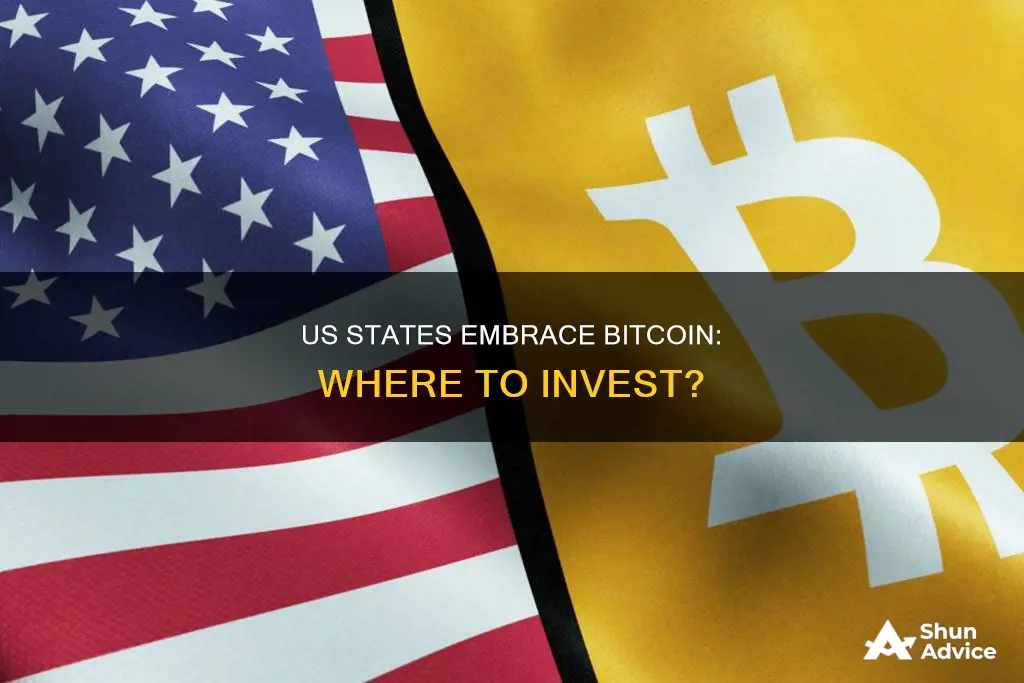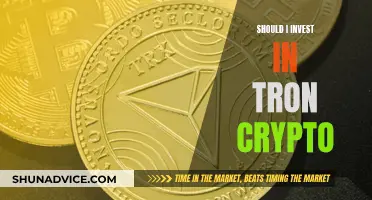
Bitcoin is a decentralised form of digital cash that uses blockchain technology to support transactions between users. It was launched in 2009 and is now accepted by thousands of merchants worldwide. However, there is no uniformity among US states regarding bitcoin regulations, and different laws apply to the sale of bitcoin in different states. Texas, Kansas, Tennessee, and Montana are considered the most bitcoin-friendly states, with no money transmitter license required to sell bitcoin or other digital currencies.
What You'll Learn

Bitcoin regulations vary across US states
In general, the US is a bitcoin-friendly nation, and much of the digital currency innovation stems from the country's tech startup scene. However, it's important to note that there is no uniformity among states in the US regarding bitcoin regulations. Different laws apply to the sale of bitcoin in different states, and the level of digital currency-friendliness varies greatly.
Texas: Texas was the first state to issue a memorandum declaring that no money transmitter license is needed to sell bitcoin or other digital currencies. The Texas Department of Banking (DOB) announced that the exchange of digital currency with fiat currency does not require a money transmitter license since bitcoin and its peers are not considered currencies because they are not issued by a government. As a result, Texas is home to several influential bitcoin startups and a large annual bitcoin conference.
Kansas: Similar to Texas, Kansas issued a memorandum stating that no money transmitter license is required to sell digital currencies within its state borders. The Office of the State Bank Commissioner clarified that decentralized digital currencies like bitcoin are neither considered money under the Kansas Money Transmitter Act (KTMA) nor a medium of exchange in the US economy. This means that individuals can buy and sell bitcoin in Kansas without any hindrance from state regulators. However, third-party digital currency exchanges are required to obtain a money transmitter license.
Tennessee: Tennessee's Department of Financial Institutions also issued a memorandum in 2015, clarifying that cryptocurrency is not considered money under the Tennessee Money Transmitter Act. Therefore, individuals can buy and sell digital currency without restrictions. However, like Kansas, third-party exchanges in Tennessee will need a money transmitter license if they offer the exchange of digital currency for sovereign currency.
Montana: Montana has no money transmitter license requirement or digital currency regulations. As a result, individuals can buy and sell bitcoin without any regulatory restrictions from the Montana Division of Banking. Additionally, the state recently provided a grant to a local digital currency mining company, demonstrating its support for the industry.
California: While not mentioned in the memorandums, California tops the bitcoin usage charts, according to CoinTracker. Los Angeles, in particular, has the most merchants accepting bitcoin and the most bitcoin ATMs in the world.
Other states: While the above-mentioned states have more explicit regulations regarding bitcoin, other states, such as Illinois, also have a significant number of bitcoin ATMs and blockchain-related businesses.
It is important to note that the regulatory landscape for bitcoin and other cryptocurrencies is constantly evolving, and it is always advisable to consult with a lawyer or inquire with the state directly to ensure compliance with the latest rules and regulations.
Exploring Bitcoin: Underage Investing and Opportunities
You may want to see also

Texas is a bitcoin-friendly state
Texas is home to several influential bitcoin startups and a large annual bitcoin conference. Houston, Texas, ranks second in the world for Bitcoin ATMs, with close to 1,339 bitcoin ATMs in the area and more than 200 merchants and retailers that accept it. The state's largest city, Houston, has a population of about 7.4 million people and is home to blockchain- and fintech-related businesses like Topl, Data Gumbo, and Qenta.
In addition to friendly policies and a strong bitcoin infrastructure, Texas also offers cheap electricity for miners.
While Texas is considered a leader in bitcoin-friendly policies and infrastructure, there have been some health and safety concerns related to bitcoin mining in the state. In Granbury, Texas, residents have reported health issues that they believe are connected to the noise from a nearby bitcoin mining facility. Similar complaints have been made near facilities in Arkansas and North Dakota.
The Ultimate Guide to Investing in Dogecoin via Cash App
You may want to see also

Kansas and Tennessee have also issued pro-bitcoin memorandums
Kansas and Tennessee's Pro-Bitcoin Memorandums
Kansas
The Office of the State Bank Commissioner issued a guidance document in June 2014, stating that decentralized digital currencies like Bitcoin are neither considered money for the purposes of the Kansas Money Transmitter Act (KTMA) nor a medium of exchange in the current US economy. Therefore, transmitting digital currencies does not fall under the KTMA and is not regulated. This means that individuals can buy and sell Bitcoin without any hindrance from state regulators. Only third-party digital currency exchanges are required to obtain a money transmitter license in Kansas.
Tennessee
Tennessee's Department of Financial Institutions Commissioner Greg Gonzales issued a memorandum in 2015 to clarify the state's stance on the sale of digital currencies. The memo states that "because cryptocurrency is not money under the Tennessee Money Transmitter Act, receiving it in exchange for a promise to make it available at a later time or different location is not money transmission." As a result, individuals can buy and sell digital currency without restrictions. Similar to Kansas, third-party exchanges in Tennessee will require a money transmitter license if they offer the exchange of digital currency for sovereign currency.
In addition to these pro-bitcoin memorandums, both Kansas and Tennessee have RockItCoin ATMs where individuals can buy and sell Bitcoin. These ATMs can be found in various locations across the states and offer convenient access to cryptocurrency transactions.
Best Coinbase Investments: Where to Put Your Money
You may want to see also

Montana has no money transmitter license requirements for bitcoin
In the United States, the use of bitcoin varies from state to state, with different laws and regulations governing its sale and use. Notably, Montana has no money transmitter license requirements for bitcoin, allowing individuals to buy and sell bitcoin without regulatory restrictions from the Montana Division of Banking. This is because the state does not regulate money transmitters and does not consider them money under the law.
Montana is an outlier in this regard, as most states have some version of a money transmitter business license requirement. Money transmitters are broadly defined as individuals or companies that transfer funds or provide payment services. While there is no uniform definition across states, Montana's lack of regulation stands out.
The state's stance on bitcoin is particularly interesting given its recent grant of $416,000 to Project Spokane, a local digital currency mining company, as part of a job-generating package. This indicates a certain level of support for the industry, even without explicit regulations.
It is worth noting that while Montana does not require a special license for money-service businesses, these businesses must still register with the Montana Secretary of State. Additionally, federal regulations may still apply to certain bitcoin-related activities, such as operating a Bitcoin ATM.
Overall, Montana's lack of money transmitter license requirements for bitcoin sets it apart from most other states and contributes to a favourable environment for bitcoin investors and businesses in the state.
Investing in Bitcoin: Top Stock Picks
You may want to see also

California tops the bitcoin usage charts
California is at the forefront of Bitcoin and cryptocurrency development. According to CoinTracker, California tops the bitcoin usage charts in the US. This is perhaps unsurprising, given that California is home to Silicon Valley and a large chunk of the US tech industry.
Bitcoin Hotspots in California
The greater Los Angeles area has the most merchants accepting bitcoin in the US, with about 1,710 bitcoin ATMs. It also has more than 400 blockchain-related businesses, giving it the title of the city with the most companies involved in the blockchain industry.
California also has six of the top ten US cities with the most crypto users: San Francisco, Santa Clara, Mountain View, Sunnyvale, Palo Alto, and San Mateo.
Bitcoin Regulation in California
California has a minimal regulatory environment for Bitcoin exchanges, which has allowed them to thrive. In 2014, Assembly Bill 129 removed an obsolete ban on Bitcoin and allowed it to be used for purchasing goods and transmitting payments. In 2015, AB 1326 was approved, calling for digital currency companies to be regulated similarly to banks. Crypto firms welcomed this legislation as it provided a wide range of exemptions and only applied to businesses that maintained full custody of client funds or operated as exchanges.
Buying Bitcoin in California
There are several exchanges offering Bitcoin in California, including Coinbase and Kraken, both headquartered in San Francisco. Bitcoin can also be purchased through automated teller machines (ATMs) and peer-to-peer (P2P) exchanges such as LocalBitcoins.
Dogecoin Investment Strategies: How to Invest Wisely
You may want to see also
Frequently asked questions
Yes, Bitcoin is legal in the US. However, there is no uniformity among states regarding Bitcoin regulations. It is important to check the specific regulations in your state before investing.
Texas, Kansas, Tennessee, and Montana are considered the most Bitcoin-friendly states due to their lack of money transmitter license requirements and digital currency regulations.
You can buy Bitcoin through a cryptocurrency exchange, an app that allows Bitcoin purchases, or a brokerage that offers cryptocurrencies as an investment option. Popular exchanges in the US include Coinbase, Kraken, Gemini, and Binance.
You can buy any amount of Bitcoin, as you do not have to purchase a whole Bitcoin. The minimum investment on some platforms is as low as $1.







